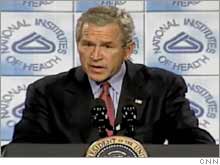 |
| President Bush detailing the government's plans Tuesday to combat the threat from bird flu. |
|
|
|
NEW YORK (CNN/Money) -
Bob Goldberg flies more than 150,000 miles a year on business, but his flight from Chicago to Singapore this Friday has him more nervous than most. The reason -- the threat of bird flu.
"Did it prompt me not to go? No, but it did raise a concern," said Goldberg, an international lawyer who is attending a meeting about a business venture there. "The meeting was originally set for Vietnam, and it was moved because they've had the outbreak there. If it hadn't been moved, I don't think I would have gone. And even though there hasn't been an outbreak in Singapore, we've had discussions about overseas travel."
The threat of a pandemic bird flu at this point is mostly hypothetical, but serious enough for President Bush to detail government preparations and propose a $7.1 billion plan to combat a potential outbreak.
And government agencies are not the only ones preparing for the threat of a disease that has the potential to kill millions around the globe and cripple commerce. Businesses are preparing for the worst case scenario, and the already-troubled airline industry is bracing in case fear of infection causes a sharp drop in travel demand.
The outbreak of SARS over nine months in 2003 is estimated to have cost the travel industry about $8 billion worldwide, even though that disease never reached pandemic status.
"Basically, travel to these affected regions, whether Toronto or Asia, came to a very quick halt," said Greeley Koch, president of the Association of Corporate Travel Executives. "At this point we have not seen anybody cut back in travel (due to risk of bird flu). But they want to be prepared, want to learn more."
Koch said a survey of his group's U.S. members found 26 percent have formed some kind of contingency plan to deal with a pandemic flu, and another 19 percent are looking into it. The group wants all its members to incorporate the threat from a pandemic into their disaster preparedness plans, and it has formed an Airborne Contagion Containment Task Force to help corporate travel managers prepare for the worst.
The Centers for Disease Control has set up quarantine stations at 11 major international airports, and it plans to have six more open soon. The stations are where passengers on incoming flights will be taken for evaluation, not for long-term treatment.
"The airlines are part of the overall surveillance network. We have a history of working with CDC to identify passengers who might be ill," said Katherine Andrus, assistant general counsel for the Air Transport Association, the U.S. airline industry trade group.
Andrus said during the outbreak of SARS, more than 1,000 flights to the United States were met by CDC or local public health officials, although only a limited number of passengers suffering from SARS were found to be on the planes.
Bird flu has so far not been shown to pose a threat of person-to-person transmission like SARS, but it has proved to be far more lethal to those stricken with the disease, primarily in Asia.
Andrus said modern jets filter air through hospital-quality filters and exchange air in the plane more frequently than does a typical office building. But she says airlines are concerned not only about the threat of pandemic bird flu, but also a hit to air travel due to public fears about the disease.
"We realize there is a possible impact (on airlines) if public fears affect travel behavior," she said. "Right now we haven't seen that. There have been no recommendations to curtail travel. We're relying on authoritative sources like the CDC so the public can understand the risk or the absence of a risk."
But assurances will do little to maintain air travel, even among hard-to-scare business travelers, if there are reports of deaths of passengers, said Kevin Mitchell, chairman of the Business Travel Coalition, a trade group for business travelers.
"It's a little early to see the impact now. Companies are now just beginning to form committees. But there is a tension in a lot of companies," said Mitchell. "Until the headline reads 'Human-to-Human Transmission,' there's no reason to trigger those changes in travel policy. But if that happens, we could end up with a lot fewer airlines globally. I think as we see images of airport quarantine rooms, people will get message that flying isn't a good idea."
Goldberg said some of his clients and business associates are making plans to use video conferencing or other alternatives to travel in case of an outbreak. He said he's personally more nervous flying now than he was immediately after the Sept. 11 terrorist attack.
"Sept. 11 was an aberration, four planes out of thousands of planes," he said. "This is something you can contract from someone else on the plane and you don't know what the ramifications are going to be."
Still he's not sure that staying home will be a better option for him or other business travelers if there is an outbreak.
"Who knows where we're safe," he said.
For more news on the push for a bird flu vaccine, click here.

|